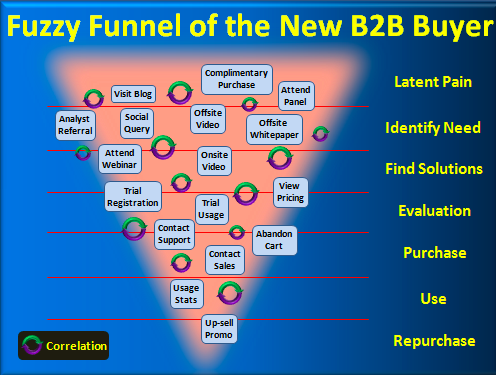food & beverage marketing
Three Keys to B2B Content Marketing for Complex Sales
by Joshua Schneck

 | October 10, 2013
| October 10, 2013
There are three keys to B2B content marketing for complex sales – corporate law firm marketing, healthcare information technology products and services, medical device, B2B food manufacturing and other B2B products and services. These are sales with longer sales lead times and higher price tags, and rely on direct meetings and contacts to build relationships and close the deal. As a Minneapolis B2B content marketing agency, we’ve always matched PR, marketing and other services to the actual sales process of our clients. With content marketing, the opportunities for engaging prospects and clients have become better – including social media and analytic methods. We’ve found that three keys to B2B content marketing for complex sales are:
1. Have a documented content marketing strategy.
2. Match content marketing to the sales process.
3. Measure and improve the strategy as needed.
Documented content marketing strategies are more successful
According to research sponsored by Brightcove, the marketers who reported having a documented content marketing plan were more likely to say they were effective – 66%, than those who did not have a documented content marketing plan – 11%. I’d make some allowance for selection bias here, as those who invest the time and resources in developing a documented strategy might be inclined to score their efforts higher, but the point is that serious marketing efforts generally stem from a fair amount of analysis and planning. Unfortunately, content marketing is too often the flavor of the month and done on a piecemeal basis, without a formal strategy or plan.
What’s in an effective, documented content marketing strategy? At a minimum, it should set out clear goals, identify team members (including outside resources) and responsibilities, contain a SWOT analysis, and lay out basic tactics and timetable. Ideally, it should also include a description and analysis of your sales and marketing process and spell out how content marketing will support – and in some cases, lead – that process. In addition, it should identify prime topics to focus on – topics that of are interest to your prospects and customers in ways that help build a case for ultimately buying your product or service. For example, a company trying to sell software to drive efficiencies in the hospital emergency department might publish white papers, case studies, blog entries, etc. on revenue, margin, cost and quality issues for hospitals. A law firm selling intellectual property services might focus on content that explores the implication of new laws, rulings, treaties and technologies that present challenges and opportunities to their clients and prospects.
Match B2B content marketing to the sales process
As Joel York illustrates with this graphic in his excellent blog, the B2B buyer enters a “fuzzy funnel” that is built on content marketing and social media. Much of the old “solution selling” has already occurred before a sales rep has spoken with the customer. As Brent Adamson, Mathew Dixon and Nicholas Toman point out in their Harvard Business Review article:
“A recent Corporate Executive Board study of more than 1,400 B2B customers found that those customers completed, on average, nearly 60% of a typical purchasing decision—researching solutions, ranking options, setting requirements, benchmarking pricing, and so on—before even having a conversation with a supplier. In this world the celebrated ‘solution sales rep’ can be more of an annoyance than an asset. Customers in an array of industries, from IT to insurance to business process outsourcing, are often way ahead of the salespeople who are ‘helping’ them.”
The good news here is that the right mix of content marketing, matched to the actual sales process, will support your sales effort and boost inbound marketing. Careful attention to relevant government or industry standard setting developments, major trade shows, LinkedIn discussion groups, pain points and other factors will provide guidance on the mix and timing of content marketing initiatives (set out in the the documented strategy, of course). We had a patent law firm client where we focused on a key change in an obscure part of IP law. Two weeks after publishing a document on the subject, a prospect contacted the author and signed up for more than $1,000,000 in legal services.
Measure and improve the strategy as needed
In the old days of marketing, you did your best analysis, conducted effectiveness research of varying value, and prayed a lot. Today, the analytics permit fine and real time measurement of everything you’re doing in content marketing. Are you not currently measuring? You’re not alone. Only 15% of attendees as a recent content marketing conference reported good measurement. Yet, the tools are there already, via Google, your website, Twitter, etc. By tracking page views, downloads, shares, guest postings, lead generation and impact on sales, you can measure impact and ROI and make adjustments in real time. The important thing is to measure things that are critical to your actual sales process, and that offer insights of value. There’s no cookie cutter approach here. Customize it.
In addition, listen to what prospects and customers are saying in their posts, Tweets, blogs and to your sales people. If Regulation “Q” is on everyone’s mind, it makes sense to address content to that concern. With good measurement tools, and a close ear to what prospects and customer are saying, your content marketing will be relevant, timely, and most importantly, effective.
Questions? Comments?
We’d love to hear you questions or comments. Please contact me directly. As a Minneapolis B2B content marketing agency, we’re eager to keep learning and carrying on a dialogue with like-minded professionals.
New restrictions for energy drink marketing?
by Joshua Schneck

 | September 26, 2013
| September 26, 2013
Four U.S. Senators are calling for new restrictions for energy drink marketing, calling on 17 beverage manufacturures to avoid marketing their energy drinks to youngsters, according to an article by Keith Nunes in Food Business News. The letter states in part:
“Across the board, makers of energy drinks say they do not market their products to children,” Mr. Durbin said. “But we know that energy drinks are promoted through social media, and that samples are often distributed at places where teens hang out — like sports events, concerts, local parks, and S.A.T. prep courses. The truth is that contrary to industry claims, energy drink companies are using highly effective tools to reach young people and it is working. It’s time for these companies to heed the advice of public health experts across the country and stop telling children and adolescents to ‘pound down’ their products.”
Voluntary Adoption of American Beverage Association Requested
The Senators urged the drink manufacturers to adopt the American Beverage Association’s Guidance for the Responsible Labeling and Marketing of Energy Drinks and take other actions designed to curtail the marketing of energy drinks to young people. At a July, 2013 Senate hearing, three manufacturers, including Red Bull and Monster, agreed to adopt the Guidance.
Maureen Beach, director of communications for the American Beverage Association, responded to the Senators letter: “Our members are responsible companies that care about their consumers, especially children and young adults, as demonstrated through existing policies and programs. While A.B.A. did not receive the letter, we’re always willing to work with elected officials on behalf of our industry to clear up any confusion regarding our products and their safety.”
As a Minneapolis healthcare PR firm that is also a Minneapolis food & beverage PR firm, we firmly believe in responsible marketing to young people. At the same time, we also believe there are limits to what laws and regulations can accomplish in promoting healthy eating and drinking habits. Common sense starts at home.
Private label and digital marketing
by Joshua Schneck

 | September 25, 2013
| September 25, 2013
Private label and digital marketing: can they co-exist? The answer is an emphatic yes, as private label and store brands join the fight for the mind and preferences of the Millenniums – AKA “generation Y.” This generation, born from the early 1980s to the early 2000s, looks to the web and mobile for information and cues about what products to buy.
Facebook, Twitter, Blogs
That means Facebook, Twitter, blogs, and consumer review sites. It also means websites and mobile apps geared toward building relationships with private label customers, the same way retail brands are doing. As a Minneapolis food & beverage PR firm and marketing agency, we offer an integrated marketing package of advertising, PR, social media, SEO and content marketing to our food & beverage clients.
Supermarket News profiled ten examples of creative marketing to advance their marketing directly to consumers. My favorite: using Twitter promotions to build awareness and reward engaged customers.
Another great article appeared recently in Private Label Store Brands, covering Jim Wisner’s presentation at the 2013 Collaboration Summit. Wisner emphasized that the retail brand threat also pointed to great opportunity for private label and store brand marketers who are ready to embrace digital marketing and social media.
Private label store brands need not wait to see their share shrink as retail brands make inroads. An integrated food & beverage PR and marketing plan can build new relationships directly with customers, while communicating the natural advantages of private label.


